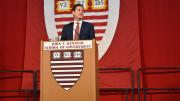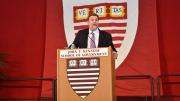David Miliband, president and CEO of the International Rescue Committee (IRC), addressed the Kennedy School’s graduating class of 2015 and their families in Cambridge’s John F. Kennedy Memorial Park on Wednesday afternoon.
In a sobering speech, Miliband noted that even though the world’s population has never been wealthier, healthier, and better educated, the number of people displaced by conflict and disaster has never been higher.
He urged the graduates to “never lose sight of passion” as they try to effect positive changes in the world—a world in which many countries are scaling down their overseas engagements. This “vacuum in the global commons,” he said, is illustrated by the devastating refugee crisis in Syria.
“We have proved the risks of not doing too much, but doing too little,” he said. “Syria’s descent into hell raises very hard questions for the humanitarian sector and for foreign policy.”
Specifically, he explained, there is a mismatch between the supply and demand of humanitarian aid: Though the humanitarian sector is designed to aid victims of wars between states, more and more help is needed by victims of civil wars. Miliband also endorsed the idea, first proposed by French foreign minister Laurent Fabius, that the veto power of the United Nations Security Council’s member states should be suspended in cases of mass atrocities.
Though his speech was weighty overall, it had lighthearted moments as well. Recounting his personal connections to the United States, the former British foreign secretary remembered attending junior high school in Newton, Massachusetts, in the 1970s. Coming to the Kennedy School, he added, reminded him of “a road not taken”: after completing his undergraduate studies at Oxford, he was offered the chance to attend the Kennedy School, but chose to attend the neighboring Massachusetts Institute of Technology—ironically, as a Kennedy Scholar. “I’m sure this wasn’t my greatest foolish mistake,” he acknowledged, “but it could count as one of my earliest.”
Miliband has already had a distinguished career in the British government, including service from 2007 to 2010 as the youngest foreign secretary in the last three decades. Now, under his leadership, the IRC offers emergency aid and long-term assistance to refugees in more than 40 countries. In introducing him, Kennedy School dean David T. Ellwood declared that Miliband “is, indeed, what we all talk about when we say we aspire to be public leaders.”










